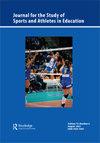Post-collegiate athlete transitions and the influence of a coach
IF 1
Q3 EDUCATION & EDUCATIONAL RESEARCH
Journal for the Study of Sports and Athletes in Education
Pub Date : 2021-04-18
DOI:10.1080/19357397.2021.1916338
引用次数: 4
Abstract
ABSTRACT Through examination of semi-structured interviews from former National Collegiate Athletic Association athletes (n = 150), this study used Schlossberg’s [1981. A model for analyzing human adaptation to transition. The Counseling Psychologist, 9(2), 2–18. doi:10.1177/001100008100900202] transition theory and Jowett’s [2007. Interdependence analysis and the 3 + 1Cs in the coach–athlete relationship. In S. Jowett, & D. Lavallee (Eds.), Social psychology in sport (pp. 15–27). Human Kinetics] 3C’s model to explore the influence of the coach, on athlete post-college transitions. Athletes found the transition difficult, experiencing feelings of identity loss and depression, while 39% reported difficulty and ease in their transition out of sport. The remaining 41% of athletes reported a smooth transition because they established identities outside of athletics and prepared for the ending of their athletic careers. Athletes voicing strong interpersonal support systems, mainly family and coaches, more successfully navigated their post-college transition than their peers who lacked interpersonal support. Finally, former athletes who noted positive athlete-coach relationships demonstrating 3Cs of commitment, closeness, and complementarity, found transition out of sport to be smooth.大学后运动员的转变与教练的影响
摘要本研究采用Schlossberg[1981。一个分析人类适应过渡的模型。咨询心理学家,9(2),2-18。doi:10.177/0011000081000900202]跃迁理论和Jowett的[2007。相关性分析和3 + 1教练与运动员之间的关系。S.Jowett和D.Lavallee(编辑),《体育运动中的社会心理学》(第15-27页)。人体动力学]3C的模型,探讨教练对运动员大学后过渡的影响。运动员发现过渡很困难,经历了身份丧失和抑郁的感觉,而39%的运动员表示,他们在退出体育运动的过渡过程中既困难又轻松。其余41%的运动员报告说,他们平稳过渡,因为他们在体育之外确立了身份,并为结束自己的体育生涯做好了准备。运动员拥有强大的人际支持系统,主要是家庭和教练,与缺乏人际支持的同龄人相比,他们更成功地度过了大学毕业后的过渡期。最后,前运动员注意到积极的运动员-教练关系表现出承诺、亲密和互补性,他们发现退出体育运动是顺利的。
本文章由计算机程序翻译,如有差异,请以英文原文为准。
求助全文
约1分钟内获得全文
求助全文
来源期刊

Journal for the Study of Sports and Athletes in Education
EDUCATION & EDUCATIONAL RESEARCH-
自引率
0.00%
发文量
25
 求助内容:
求助内容: 应助结果提醒方式:
应助结果提醒方式:


